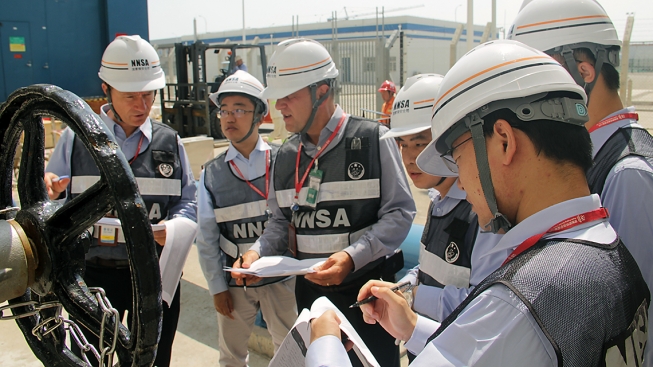Ministry issues penalties for nuclear safety
The Chinese Ministry of Environmental Protection (MEP) issued two administrative penalties on Feb. 14 for compromises in nuclear security.
 |
|
Members of the IAEA-led Integrated Regulatory Review Service (IRRS) and staff from the Chinese National Nuclear Safety Authority visit the Fuqing Nuclear Power Plant to review safety upgrades carried out as part of work to improve safety following the 2011 Fukushima accident in Japan. The September 2016 visit was part of an IRRS review of China’s regulatory framework for nuclear and radiation safety. [Photo: NNSA/MEP] |
Dalian Teikoku Canned Motor Pump Co., Ltd., a Japanese-funded company and the biggest canned motor pump manufacturer in China, was deemed by the MEP to have violated operating protocols in the welding of nuclear power units of Yangjiang Nuclear Power Station in Guangdong Province, and failed to register the design of the canned motor pump to be used in Hongyanhe Nuclear Power Station in Liaoning Province.
Dalian Teikoku also received another penalty for its welder Zhou Shundong for violating protocol in repair welding, which has led to severe quality risks.
The MEP demand Dalian Teikoku immediately halt unauthorized activities and pay a fine of 200,000 yuan (US$29,093). The MEP also revoked Zhou’s qualification licence.
The devices involved in the penalties were still in the manufacturing stage and did not compromise the actual safety or construction of the aforementioned nuclear facilities, according to MEP statements.
Nuclear safety has been given greater attention in the wake of Japan’s Fukushima incident, which was triggered by a major earthquake and the subsequent tsunami.
Minister of Environmental Protection, Chen Jining, has cautioned against nuclear risks now that China is rapidly developing its nuclear energy and nuclear technologies, posing increasing pressure on safety supervision. He urged that precautions must be in place right from the very source, in order to maintain security capabilities and reliability.
Chen said that there must be bottom lines in terms of the safety for nuclear power generation in order to implement all possible measures to lower the risk of accidents. He also called for the enhancing of emergency response responsibilities.
MEP’s statement shows that the operational nuclear power-generating units and the nuclear reactors for civil researches have maintained a sound safety record. None of the nuclear power plants nationwide have had any incident or accident above the second degree category. The accident rate involving radioactive sources has dropped to under one case in 10,000 sources each year, from above 2.5 cases in the period 2006-2010.
Liu Hua, the vice minister of Environmental Protection and director of National Nuclear Safety Administration said that there was no “absolute safety” in the nuclear industry, only “relative safety.” He said a country’s nuclear safety could only be guaranteed as long as the industry keeps improving its technology and the national regulator keeps enhancing its supervision capabilities, in addition to drawing lessons from previous nuclear accidents and incidents.
read more

